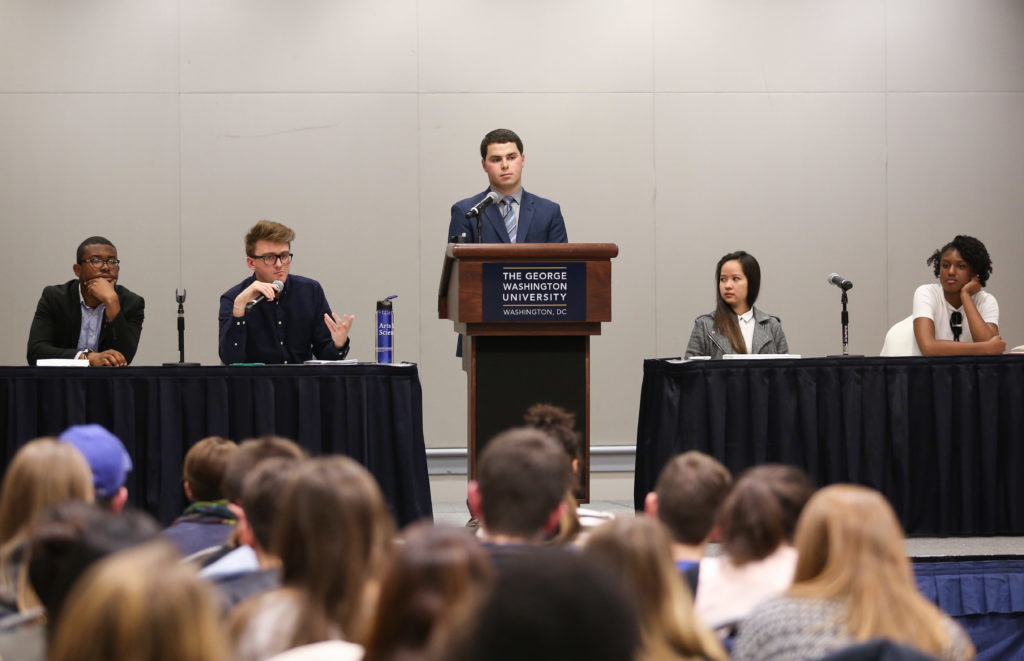Student Association candidates vying for the organization’s top two positions showcased their platforms in an annual debate Tuesday.
The four candidates running for SA president and executive vice president fielded questions by four campus media organizations on key issues ranging from dining plans to diversity measures. The hour-and-a-half-long debate was organized by the Joint Elections Commission, the body that oversees SA elections, just a week before students start voting next Tuesday.
After candidates delivered opening statements to roughly 100 attendees in the Marvin Center Continental Ballroom, Alec Snyder, a senior and anchor for GWTV, who moderated the panel, turned questions over to reporters from GWTV, WRGW, The Hatchet and The Rival GW.
In a largely friendly debate that featured no sparring between the candidates, the four contenders discussed how they plan to hold the University accountable for implementing diversity and inclusion plans – a hot-button issue that prompted administrative action after a racist Snapchat post rocked campus last month.
Sen. Imani Ross, U-at-Large and a candidate for SA president, said if elected, she will improve communication about diversity between student organization leaders and administrators. Ross spearheaded an SA resolution last month condemning the post and calling for Alpha Phi, the sorority involved in the post, to be kicked off campus.
“My diversity plan is quite simple – we create our own table. There’s no more coming to a messy table,” Ross said. “If you go down to District House and you see Chick-Fil-A on the table, you’re not going to sit there because the table is messy.”
Candidates then delved into their plans to improve transparency with administrators, a topic all four candidates said needed to be improved in their platforms.
Sen. Ojani Walthrust, ESIA-U, and a candidate for executive vice president, said he said will seek to create open dialogue with officials by hosting more town halls where students can question the University about its diversity polices and reactions to campus events.
Officials hosted a town hall last month in the wake of the racist Snapchat post, where students addressed top administrators and asked them to do more for students of color on campus.
“If anyone knows me in the audience – I hope you all do – you all know me as someone who is very persistent and even if I get a negative answer, I’ll keep on asking,” Walthrust said.
In the second half of the debate, candidates were asked individual questions about their platforms.
Ashley Le, the current SA vice president for public affairs and a candidate for SA president, expanded on her platform point to expand the number of credits students are allowed to take each semester without additional charges to 18. A referendum on the ballot next week will also ask voters whether they think students should be able to take 18 credits each semester without an added fee – and if they would take advantage of that ability.
Le said the SA “already has a plan” to implement the referendum, and that administrators she’s talked to have been receptive to the idea. If the referendum is rejected, she said she would “get the ball rolling” on more advocacy efforts.
“We have that support of student voices, not only from the votes, but also from the data saying that this is necessary, this is a priority,” Le said.
In the final round, contenders were again asked general questions about their campaigns including what ideas they liked from their opponent and their take on GW’s decision to select Marcia McNutt, the president of the National Academy of Sciences, as this year’s Commencement keynote speaker.
Brady Forrest, a candidate for executive vice president, said the keynote speaker selection “isn’t what we’re used to” because the University has traditionally selected a high-profile political or intellectual figure to speak to graduates.
While the candidates agreed there was little the SA could do about the selection, they said the decision showed a lack of awareness for student preferences.
Forrest said he would work to smooth out “road bumps” in the relationship between student leaders and administrators, including the lack of communication that led to McNutt’s selection, which many students have voiced frustration with since the announcement.
“We can renegotiate how the SA and admin work together and if it’s not a satisfactory relationship, then we escalate,” he said.




